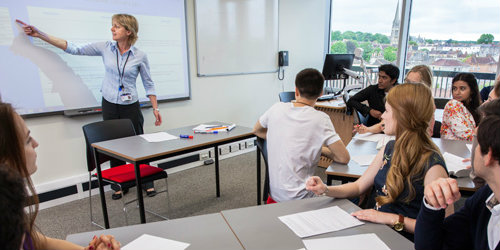Embedding research findings into teaching and learning primary maths
A successful Knowledge Exchange project funded by the ESRC Impact Acceleration Account has embedded Bristol research findings into new materials for Maths teachers
Part of Dr Alf Coles’ research is based in primary mathematics and how it’s taught, often working closely with the government-funded National Centre for Excellence in Teaching Mathematics (NCETM). In 2017, the ESRC Impact Acceleration Account (IAA) funded an innovative Knowledge Exchange enabling Alf to host an incoming Fellow and work as an outgoing Fellow, linking two key stakeholders to guide dissemination of national policy, actively influenced by his research.
Research impact – Embedding research findings into new resources for maths teachers
The NCETM were concerned that materials on Mastery teaching were becoming popular among teachers without being of sufficiently high quality. Mastery approaches to mathematicss teaching at primary school are highly current, with competing resources coming from commercial publishers and non-profit groups as well as the NCETM. They set out to produce a set of innovative, authoritative and comprehensive resources (the ‘Spine’) aimed at primary school teachers. These have the potential and reach to influence mathematics teaching across England, particularly in relation to expectations of currently low achieving students.
The successful IAA-funded Knowledge Exchange project is proving significant. The first objective was to complete the Spine itself. The ‘Addition and Subtraction’ and ‘Place Value’ strands of the National Curriculum (Years 1-6) had been done and the next phase was to do the same for ‘Multiplication and Division’ and other areas of the curriculum, which have now been completed.
This was the project strand involving Alf as the outgoing Knowledge Exchange Fellow, supporting his time engaging with NCETM throughout 2017-18 and part of 2018-19 in the development of new materials. The NCETM-funded part of this but the IAA made possible a deeper and far more significant involvement. It enabled Alf to initiate work and engage in the process of developing the framework for materials, ensuring his research insights were embedded. Without the IAA, Alf would have been restricted to an advisory role.
The second project objective was to create a Guide to Implementation for the Spine. The NCETM had no budget for this work and no trials had taken place of the documents being produced, outside the group of teachers who had developed them. Before being made freely available to teachers via the NCETM website, there was an immediate need to get their presentation right in the face ofcompeting visions of mastery.
St Andrew’s Primary School agreed to use the newly developed Spine as the basis for their maths teaching, and Alf’s contacts at GH Zeal and Company Ltd generously indicated that they would be willing to support the IAA project.
The incoming Knowledge Exchange fellow, Katherine Evans focused on trialling and articulating a professional development model around the use of the Spine material, in the context of classroom practice across each year group of the school. Working closely with Alf, her knowledge and observations of how the Spine was interpreted and used provided valuable insight and input for the Guide.
The model of professional development that emerged through this Knowledge Exchange involves a cycle of peer observation and reflection, focusing on in-depth discussion of children’s learning as a vehicle to better understanding the effectiveness of the pedagogy and practice of teaching. This cycle of teacher professional development was framed around the trial: teachers worked in collaboration across year groups to select a Spine and develop a weeklong sequence of lessons based on the materials.
The project successfully delivered its key outputs - finalising the innovative Spine material with its significant, evidence-based shift in emphasis from the current National Curriculum, and the Guide to its implementation. Working together as Knowledge Exchange collaborators, Alf and Katherine helped the process of publication of the Spine materials on the NCETM website and the start of their use by teachers as planned in 2018. By early July 2019, there had been over 146,000 downloads of the powerpoint materials and over 112,000 downloads of the Teacher Guides.
One Bristol school making use of the materials in 2018/19 commented: “Using the materials has gone really well. [We have noticed] how confident the Year 1s [are] in their maths talk and reasoning … We will be using the newly published materials next year and … focusing on making sure Year 2 build on Year 1's success so the skills roll up the school.”
NCETM are making the materials the basis of National Collaborative Working Groups in all 35 of their Maths Hubs, ensuring their reach across the country. Alf Coles’ engagement with the NCETM has deepened and developed over the course of this project and he is now involved in (and funded for) the other Primary Spines, as well as consulting on new Secondary-level materials.
Date published
August 2019
Researcher
Non-academic partners
National Centre for Excellence in Teaching Mathematics (NCETM)
Funders
Related research groups
 Study Education
Study Education
Join us in improving educational environments for future generations



